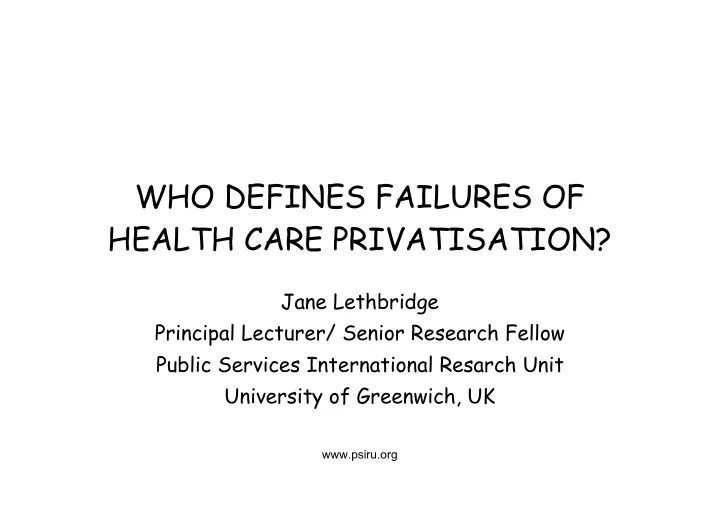

WHO DEFINES FAILURES OF HEALTH CARE PRIVATISATION? Jane Lethbridge Principal Lecturer/ Senior Research Fellow Public Services International Resarch Unit University of Greenwich, UK www.psiru.org
CONTINUUM OF PRIVATISATION • Private sector contracted to run ancillary services • Private sector contracted to run clinical services • Public private partnerships – private sector invests in high technology equipment • Public private partnerships – private sector builds new hospitals and is contracted to run the hospitals on long-term management contracts • Private sector purchases hospitals www.psiru.org
FAILURE • User view - restricted access to services and deterioration in the quality of services; • Company view - bankruptcy and withdrawal from market; • Government view – poor value for money or ineffective www.psiru.org
COMPANY EXPANSION • “Health systems, not only in Germany but all over the world, are in a state of change which is marked by increasing privatisation of hospitals and the demand for qualified, economically- efficient care of patients” • Gerd Krick, Chairman Fresenius, April 2001 Annual General Meeting www.psiru.org
FAILURE Uneconomic due to: • Better medical knowledge • Improved treatments • Shorter bed occupancy • Higher VAT rates • Increased energy prices • Small reduction of 0.07% of the health budget www.psiru.org
FAILURE • Chaotic management • No support from other hospital • Lack of employee involvement • Lack of interest by company in providing services to local people www.psiru.org
SOLUTION • 105 of 160 workers taken on by local hospital • € 2 million paid by Fresenius for staff redundancy costs • € 10 million paid by Fresenius to pay off hospital debts www.psiru.org
TREATMENT CENTRES • 2000, the UK government announced an increase in investment in the NHS, as set out in the NHS Plan. • 2002 Delivering the NHS Plan: next steps on investment, next steps on reform • Creation of a network of Treatment Centres, described as a “ network of fast-track surgery units ”, to reduce waiting lists • Run part by NHS and some by the private sector • £700 million per year was to be invested into these new centres. www.psiru.org
VALUE FOR MONEY • Manchester ISTC (Netcare, South African company) lost £2m to the local NHS in its first six months of operation • 14 local health services commissioners paid £1.9m to Netcare for operations not carried out because patients opted for traditional NHS care • ISTC only performed 4,000 out of 6,000 contracted operations • Netcare paid full amount • Hospital Doctor magazine found doctors were being paid £30 for every patient sent to Greater Manchester ISTC www.psiru.org
PRICES • In 2006, every cataract operation at the Mercury Healthcare ISTC at St Mary's Hospital, Portsmouth, cost £5,590 compared to the standard NHS price of £847. • The NHS paid £335,412 for 60 cataract operations at the private-sector centre 2005-2006 but the same number would cost £50,820 at an NHS hospital. • Mercury Healthcare has an £84m, five-year contract, with local NHS commissioners to carry out 1,650 cataract operations a year, but the company gets paid whether patients are referred or not. • The government also pays out an extra 20% to compensate Mercury for setting up the £10m centre www.psiru.org
TRAINING • British Medical Association concerned at the scope for international companies to take on NHS staff and impact on routine surgery, important for training. • Second phase of ISTCs allowed to take NHS staff on secondment. • New ISTCs involved in training • Companies have recruited international doctors, often untrained in NHS systems and procedures • Increasing number of complaints www.psiru.org
LACK OF DATA • Healthcare Commission unable to evaluate the ISTCs - lack of data available to compare them to NHS services. • Emphasis on speed for setting up new centres so systems for collecting data not been set up • The Department of Health had asked companies to report “ key performance indicators ” as well as routine NHS statistics but this had not been collected • Emergency readmission rates for hip replacements was similar to NHS rates but “T his is perhaps unexpected, given the mix of patients treated at ISTCs, which excluded those with the most complex needs ” (Healthcare Commission, 2007). www.psiru.org
PRIMARY PURPOSE Part of the invitation for bids for the second wave of ISTCs: • “ The primary purpose of the contracts would be to help create a "sustainable" market in the provision of elective care to NHS patients and encourage competition between NHS and private providers ” • Private providers could take over NHS buildings and equipment. www.psiru.org • 22 September 2005 The Guardian
THIRD WAVE ABANDONED • 26 July 2007 announcement to abandon 3 rd wave of ISTCs • Private sector providers dismay but many contracts continuing • New plans for contracting out commissioning at local level to private sector • Netcare expanding in international market www.psiru.org
ISTC PROBLEMS • Inflexible 5 year contacts • No transparent pricing • Lack of data • Impact on local health care providers • Involvement of private sector in training www.psiru.org
CONCLUSION • Failures do not always lead to policy changes • Changing role of government • Pricing of health care • Growing presence of private sector • Future training of health workers www.psiru.org
Recommend
More recommend